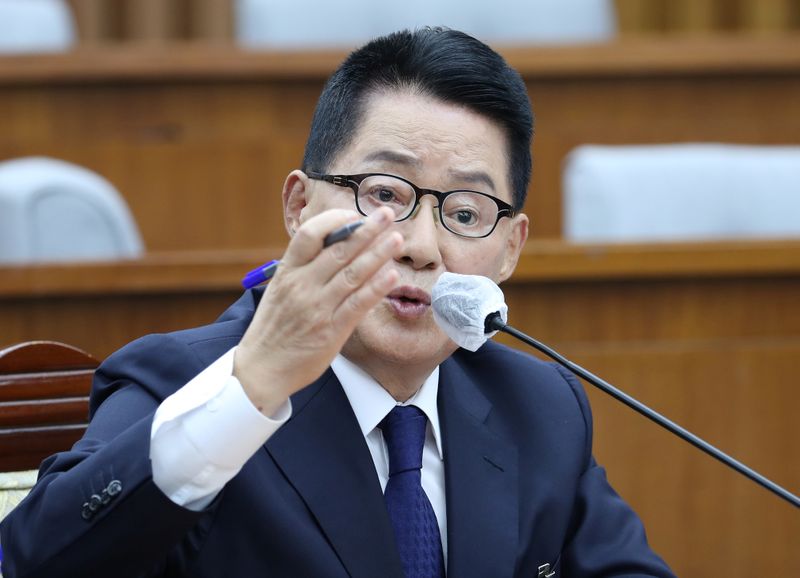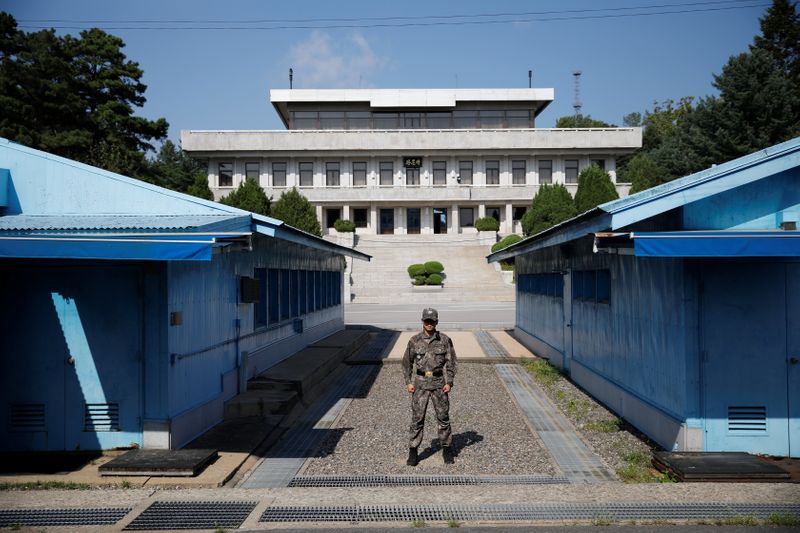By Hyonhee Shin
SEOUL (Reuters) - South Korean President Moon Jae-in's new point men on North Korea face a daunting challenge: they must engineer a breakthrough in strained ties amid public scrutiny of their history with Pyongyang, which once landed them in prison.
Moon this week appointed Park Jie-won as director of the National Intelligence Agency (NIS) and Lee In-young as the unification minister, seeking to cement progress with North Korea as a major legacy in his final two years in office.
The two men, both longtime lawmakers, are key advocates of Moon's drive for inter-Korean rapprochement, but their political pasts rekindled the controversies and debates that have shaped Seoul's relations with Pyongyang.
Both of them have a dramatic history with North Korea.
A former businessman, Park was sentenced to three years in prison for helping the late President Kim Dae-jung arrange for Hyundai, which was operating North Korea businesses, to send $450 million to Pyongyang.
Hyundai said the money was for business rights, but the court ruled the payment was to facilitate the inter-Korean summit in 2000 with leader Kim Jong Il, and came through the NIS.
Park served about eight months in prison before he was pardoned.
Park, 78, said at his confirmation hearing on Monday that the payment was "inappropriate" and that he complied with the court ruling, but the verdict was wrong because the money was wired by Hyundai without his knowledge.
Opposition lawmakers said Park's appointment could send the wrong message to Pyongyang and Washington. Moon is trying to restart inter-Korean economic projects even as nuclear negotiations have stagnated.
The NIS could play a catalytic role in behind-the-scenes negotiations with the North, but the agency's opaque structure has triggered calls for overhaul. Many former directors and senior officials have been imprisoned for illegal political meddling.
"I don't believe the government would seek illicit financial transactions for another summit, but there would be greater temptations to resort to an abnormal approach in finding a breakthrough with North Korea," said Cho Tae-yong, an opposition lawmaker who was formerly a deputy national security adviser and nuclear negotiator.
Park vowed to transparently carry out policy and steer clear of illegal activity.
"I would help bring a breakthrough in inter-Korean relations and respond with reform that cleans up the dark side of the NIS' history," he told Moon during an appointment ceremony on Wednesday.
Lee, 56, was a prominent democracy campaigner who led a student activist group in the 1980s seen by some as revering North Korea's founding father Kim Il Sung and his "juche," or self-reliance, ideology.
He was sentenced to one and a half years in prison in 1988 on charges of possessing North Korean propaganda materials and hosting protests that might cause "social unrest," but was pardoned six months later.
"When I was young, our primary cause was to accomplish unification, because dictators exploited the national division to persecute us democracy activists," Lee told Reuters in 2018. "Some people called us North followers but that's not true, though we might have a warmer heart than others toward the North and greater patience to achieve peace."
During his confirmation hearing on Friday, Lee faced off with lawmaker Thae Yong-ho, a North Korean defector, who questioned whether Lee still harboured belief in the juche philosophy, prompting angry denials.

Some human-rights activists also criticised Lee for defending the Unification Ministry's controversial decision to revoke the licenses of defector groups that send anti-Pyongyang propaganda leaflets to the North.
